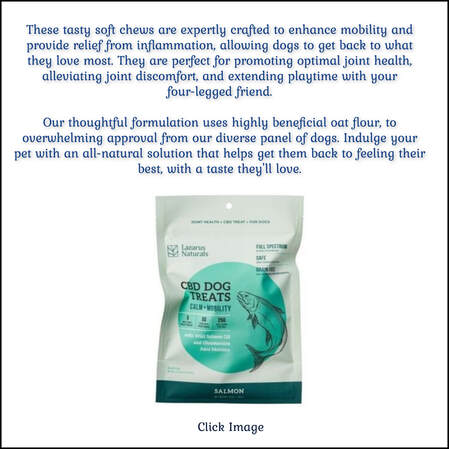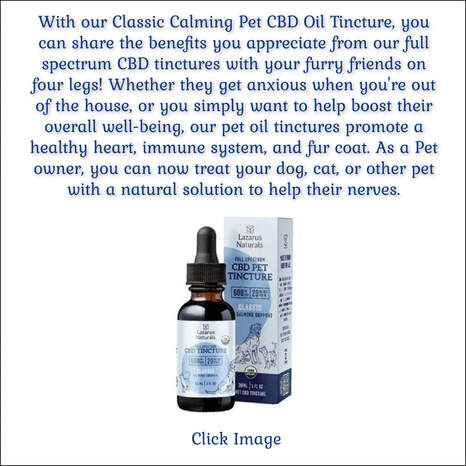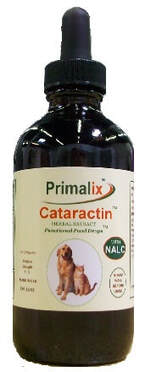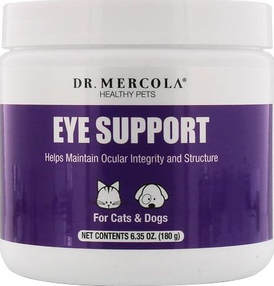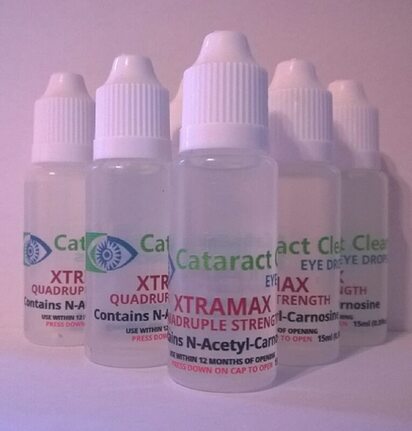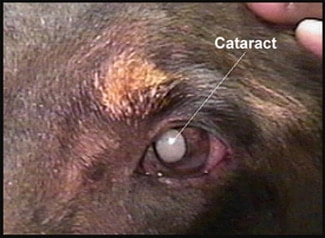
By Dr. Becker
Cataracts are a clouding of the lens of the eye. The lens is inside a clear capsule, and the cataract clouds up the inside of the capsule. So a cataract isn't a film over the eye itself. It's a change inside the clear sack that contains the lens. Clouding or fogging of the lens can be so minor it doesn't even interfere with vision. This is called an incipient cataract. An immature cataract clouds a greater portion of the lens and can cause some blurred vision. Over time, the entire lens can cloud up and all vision is lost. This is called a mature cataract. As a cataract progresses, the pupil, which is the center part of the eye, can go from black to a bluish and even white color. There are also hypermature cataracts. These develop over months or years and cause the lens capsule to wrinkle and the lens inside to shrivel. Some hypermature cataracts are completely cloudy. Others have clear areas that allow for some vision if the rest of the eye is still functional. The presence of a cataract doesn't necessarily mean blindness. Cataracts can progress very slowly over many years or they can come on very quickly, leading to blindness within a few days or weeks. Both dogs and cats can get cataracts, but they are much more common in dogs.
Cataracts are a clouding of the lens of the eye. The lens is inside a clear capsule, and the cataract clouds up the inside of the capsule. So a cataract isn't a film over the eye itself. It's a change inside the clear sack that contains the lens. Clouding or fogging of the lens can be so minor it doesn't even interfere with vision. This is called an incipient cataract. An immature cataract clouds a greater portion of the lens and can cause some blurred vision. Over time, the entire lens can cloud up and all vision is lost. This is called a mature cataract. As a cataract progresses, the pupil, which is the center part of the eye, can go from black to a bluish and even white color. There are also hypermature cataracts. These develop over months or years and cause the lens capsule to wrinkle and the lens inside to shrivel. Some hypermature cataracts are completely cloudy. Others have clear areas that allow for some vision if the rest of the eye is still functional. The presence of a cataract doesn't necessarily mean blindness. Cataracts can progress very slowly over many years or they can come on very quickly, leading to blindness within a few days or weeks. Both dogs and cats can get cataracts, but they are much more common in dogs.
|
Feline Cataracts
Cataracts are actually rare in cats, and are usually caused by an eye infection or injury to the eye. Uveitis is a common feline inflammatory eye condition that is often a suspected underlying cause of cataract formation. Uveitis is a painful condition that causes kitties to squint, have watery eyes, sensitivity to light, and even spasms of the eyelids. Chronic uveitis is often secondary to major diseases like feline leukemia virus (FeLV), feline immunodeficiency virus (FIV), feline infectious peritonitis (FIP), and toxoplasmosis. Feline cataracts that are hereditary in nature are extremely rare. Cats can develop diabetic cataracts, but this too is quite uncommon. |
How Canine Cataracts Develop
Cataracts in dogs are much more clinically significant than in cats.
Most dogs have inherited cataracts, and they can develop at any age. Cataracts are more prevalent in purebred dogs than mixed breeds. Some breeds are more prone than others, including the cocker spaniel, poodle, Siberian husky, schnauzer, old English sheepdog, Samoyed, golden retriever, Labrador retriever, Maltese, Boston terrier and Yorkshire terrier.
Diabetes is a primary cause of cataracts in dogs. In fact, 75 percent of diabetic dogs will develop blindness from cataracts within a year of diagnosis. Diabetic cataracts occur very quickly – sometimes literally overnight. Your dog goes to bed with normal eyes, and in the morning his eyes are white.
If your dog did not have cataracts yesterday and today he does, you need to get him to the vet immediately for a diabetes workup.
Cataracts in dogs are much more clinically significant than in cats.
Most dogs have inherited cataracts, and they can develop at any age. Cataracts are more prevalent in purebred dogs than mixed breeds. Some breeds are more prone than others, including the cocker spaniel, poodle, Siberian husky, schnauzer, old English sheepdog, Samoyed, golden retriever, Labrador retriever, Maltese, Boston terrier and Yorkshire terrier.
Diabetes is a primary cause of cataracts in dogs. In fact, 75 percent of diabetic dogs will develop blindness from cataracts within a year of diagnosis. Diabetic cataracts occur very quickly – sometimes literally overnight. Your dog goes to bed with normal eyes, and in the morning his eyes are white.
If your dog did not have cataracts yesterday and today he does, you need to get him to the vet immediately for a diabetes workup.
Another common cause of cataracts in dogs is toxicity from drugs like vaccines, heartworm preventives, and flea/tick medications.
Another underlying eye disease like progressive retinal atrophy, uveitis or glaucoma can also cause cataracts. It's important your dog's vet makes sure there's not an underlying root cause for your pet's cataracts.
Another underlying eye disease like progressive retinal atrophy, uveitis or glaucoma can also cause cataracts. It's important your dog's vet makes sure there's not an underlying root cause for your pet's cataracts.
|
Trauma to a dog's eye can cause the lens capsule to rupture. In a rupture, the contents of the lens leak out. This can lead to a severe form of uveitis, which can then lead to cataracts. If your dog suffers any kind of injury to the eye, I recommend you get her to the vet as soon as possible. Sometimes you can't tell right away if there's damage to the lens capsule, and by the time it's noticeable it can be too late to save your pet's eye. Puppies fed a nutritionally unbalanced milk replacement can develop cataracts due to nutritional deficiencies. Fortunately, this type of cataract often improves as the puppy grows older. Older dogs will develop cataracts secondary to the aging process, but these are typically small and very slow to develop. They usually don't cause serious vision problems for senior dogs.
|
Diagnosis and Treatment
If you suspect your pet has a cataract because you see some clouding of the eye or she's having vision problems, I recommend a visit to your veterinarian. Even better is an appointment with a veterinary ophthalmologist for a complete eye examination. If the diagnosis is cataracts, less troublesome ones will be rechecked periodically to see if they're progressing. Sometimes anti-inflammatory eye drops are prescribed. If your pet's vision is affected, her quality of life is compromised, or if the cataracts are progressing rapidly, surgery is sometimes recommended to restore vision.
If you suspect your pet has a cataract because you see some clouding of the eye or she's having vision problems, I recommend a visit to your veterinarian. Even better is an appointment with a veterinary ophthalmologist for a complete eye examination. If the diagnosis is cataracts, less troublesome ones will be rechecked periodically to see if they're progressing. Sometimes anti-inflammatory eye drops are prescribed. If your pet's vision is affected, her quality of life is compromised, or if the cataracts are progressing rapidly, surgery is sometimes recommended to restore vision.
Surgery to Correct Cataracts
If a veterinary ophthalmologist recommends surgery for your pet, the outcome will be better if you opt for surgery sooner rather than later – preferably before the cataract matures. Mature cataracts are more difficult to manage during surgery than less advanced cataracts.
Surgery to remove cataracts is done under general anesthesia. A small incision is made in the eye, and most often a procedure called phacoemulsification, which is the same technique used on human cataracts, is employed to break down the cataract and remove the cloudy lens.
The lens is removed from the lens capsule, and in most patients the lens can be replaced with an implant. The implant is permanent and can restore almost normal vision to your pet – and in some cases, completely normal vision is achieved.
Successful cataract surgery results in an immediate and profound cure for pets who've been suffering from decreased vision.
However, sometimes the lens capsule is loose-fitting or can't be fragmented completely by emulsification. When this happens, the lens and lens capsule are removed, and in this situation there's no way to do a lens replacement.
Pets with this issue can still see, believe it or not, after their surgery. They just won't see as well as those who've received a replacement lens.
If a veterinary ophthalmologist recommends surgery for your pet, the outcome will be better if you opt for surgery sooner rather than later – preferably before the cataract matures. Mature cataracts are more difficult to manage during surgery than less advanced cataracts.
Surgery to remove cataracts is done under general anesthesia. A small incision is made in the eye, and most often a procedure called phacoemulsification, which is the same technique used on human cataracts, is employed to break down the cataract and remove the cloudy lens.
The lens is removed from the lens capsule, and in most patients the lens can be replaced with an implant. The implant is permanent and can restore almost normal vision to your pet – and in some cases, completely normal vision is achieved.
Successful cataract surgery results in an immediate and profound cure for pets who've been suffering from decreased vision.
However, sometimes the lens capsule is loose-fitting or can't be fragmented completely by emulsification. When this happens, the lens and lens capsule are removed, and in this situation there's no way to do a lens replacement.
Pets with this issue can still see, believe it or not, after their surgery. They just won't see as well as those who've received a replacement lens.
Animals with the whole lens removed will also end up being far-sighted, which means objects close to them will be blurry. These patients will adjust over time and usually wind up with good functional vision.
Diabetic cats rarely get cataracts, but the opposite is true of diabetic dogs. Most will not only develop cataracts, but will typically go blind between 6 and 12 months after the onset of diabetes. If the diabetes is well-controlled and so is the inflammation associated with the cataract, these dogs are also good candidates for cataract surgery.
Most pets have nearly normal vision after cataract surgery. Not perfect vision, but often darn close.
Unfortunately, dogs tend to have more inflammation after surgery than people do, which can cause some scarring. This scarring can slightly diminish vision. All in all, veterinary cataract surgery has become quite common. Although it's an expensive procedure, it is now considered routine.
Fortunately, the majority of dogs and cats with cataracts don't necessarily need the surgery. The presence of a cataract doesn't automatically mean that your pet must undergo surgery.
Is It Cataracts … or Something Else?
Diabetic cats rarely get cataracts, but the opposite is true of diabetic dogs. Most will not only develop cataracts, but will typically go blind between 6 and 12 months after the onset of diabetes. If the diabetes is well-controlled and so is the inflammation associated with the cataract, these dogs are also good candidates for cataract surgery.
Most pets have nearly normal vision after cataract surgery. Not perfect vision, but often darn close.
Unfortunately, dogs tend to have more inflammation after surgery than people do, which can cause some scarring. This scarring can slightly diminish vision. All in all, veterinary cataract surgery has become quite common. Although it's an expensive procedure, it is now considered routine.
Fortunately, the majority of dogs and cats with cataracts don't necessarily need the surgery. The presence of a cataract doesn't automatically mean that your pet must undergo surgery.
Is It Cataracts … or Something Else?
Nuclear sclerosis is a more common eye problem in older pets than cataracts. And it's easy for pet parents to confuse the two. Nuclear sclerosis causes the lens fibers to harden and condense over time, causing the eye to take on a bluish or grayish appearance. Unlike cataracts, this condition doesn't seriously affect vision and no treatment is necessary. Your dog may act like he needs reading glasses.
In my house, Rosco, who is turning 12, will occasionally miss the treats we throw to him. And sometimes when one lands on the ground, he'll sniff off to the side of it and then identify it and snap it up. He has the beginnings of nuclear sclerosis, and I'm not concerned about it. It's an age-related change.
If you see your pet's eyes taking on a different color, it's very important that your vet makes sure it's nuclear sclerosis and not another more serious eye condition.
The most important thing you can do for a pet with nuclear sclerosis is slow down age-related changes as much as possible.
In my house, Rosco, who is turning 12, will occasionally miss the treats we throw to him. And sometimes when one lands on the ground, he'll sniff off to the side of it and then identify it and snap it up. He has the beginnings of nuclear sclerosis, and I'm not concerned about it. It's an age-related change.
If you see your pet's eyes taking on a different color, it's very important that your vet makes sure it's nuclear sclerosis and not another more serious eye condition.
The most important thing you can do for a pet with nuclear sclerosis is slow down age-related changes as much as possible.
Preventing Degenerative Eye Disorders in Your Pet
You can also do things to help reduce or prevent cataracts, one of the most important of which is to keep your pet at a normal weight so she doesn't develop diabetes.
Cataracts are inevitable in diabetic dogs. They are fast-acting and will render your dog blind within a short period of time. Surgery is your only option to restore vision to your pet, and the success of surgery is often dependent on how well you're able to manage the diabetes.
So it's simpler, and certainly much kinder and less expensive to keep your dog in good physical shape and at a healthy weight. Diabetes and cataracts are just two of a long list of diseases overweight pets are at risk for.
Also remember not to allow your pet to be over-vaccinated or given other unnecessary medications. Keep all chemicals going into and onto your pet's body to a bare minimum. As I mentioned earlier, we know some cataracts develop as a result of drug-related systemic toxicosis.
It is also important to provide your pet a diet rich in antioxidants. Those of you who have watched my videos know I'm a big believer that the best source of antioxidants is real food. That means serving your pet a living, raw food diet.
Antioxidants scavenge free radicals and can slow down degenerative changes in your pet's eyes, including nuclear sclerosis and cataracts. Specifically, vitamins C and E are antioxidants that are thought to slow down the development and progression of cataracts.
Another excellent supplement you can add to your pet's food in pill or raw food form is bilberries. Bilberries are rich sources of flavonoids and have antioxidant properties. Taken with vitamin E, they are known to be protective to the eye tissue in humans, and have proven to halt lens clouding in nearly all people with early stage cataracts, which is very promising.
You can also do things to help reduce or prevent cataracts, one of the most important of which is to keep your pet at a normal weight so she doesn't develop diabetes.
Cataracts are inevitable in diabetic dogs. They are fast-acting and will render your dog blind within a short period of time. Surgery is your only option to restore vision to your pet, and the success of surgery is often dependent on how well you're able to manage the diabetes.
So it's simpler, and certainly much kinder and less expensive to keep your dog in good physical shape and at a healthy weight. Diabetes and cataracts are just two of a long list of diseases overweight pets are at risk for.
Also remember not to allow your pet to be over-vaccinated or given other unnecessary medications. Keep all chemicals going into and onto your pet's body to a bare minimum. As I mentioned earlier, we know some cataracts develop as a result of drug-related systemic toxicosis.
It is also important to provide your pet a diet rich in antioxidants. Those of you who have watched my videos know I'm a big believer that the best source of antioxidants is real food. That means serving your pet a living, raw food diet.
Antioxidants scavenge free radicals and can slow down degenerative changes in your pet's eyes, including nuclear sclerosis and cataracts. Specifically, vitamins C and E are antioxidants that are thought to slow down the development and progression of cataracts.
Another excellent supplement you can add to your pet's food in pill or raw food form is bilberries. Bilberries are rich sources of flavonoids and have antioxidant properties. Taken with vitamin E, they are known to be protective to the eye tissue in humans, and have proven to halt lens clouding in nearly all people with early stage cataracts, which is very promising.
You can also talk with your holistic vet about supplementing your dog's diet with beta-carotene or astaxanthin. Dogs and cats can also benefit from supplemental glutathione and alpha-lipoic acid, which are also antioxidants and have been shown to dramatically reduce the risk of developing cataracts and nuclear sclerosis. There are also nutraceutical eye drops and Chinese herbs that have shown good success in reducing how quickly lens degeneration occurs. Those products can be prescribed by your holistic vet based on your pet's specific eye changes.
Most importantly, if you see changes occurring in your pet's eyes, have your dog or cat evaluated by your veterinarian to make sure you're doing all you can to prevent further degeneration, and to slow or even stop the progression of an existing condition like cataracts or nuclear sclerosis.
Most importantly, if you see changes occurring in your pet's eyes, have your dog or cat evaluated by your veterinarian to make sure you're doing all you can to prevent further degeneration, and to slow or even stop the progression of an existing condition like cataracts or nuclear sclerosis.
Some other supplements that you may try....
I will a more products as they are found.
click images
I will a more products as they are found.
click images






